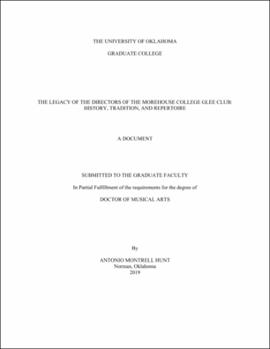| dc.description.abstract | Since its inception in 1911, The Morehouse College Glee Club has gained both national and international recognition through artistic performances. Its legacy, which developed out of a European historical tradition of male singing societies, has sustained the overall success of this organization. The aesthetic musical value of their performances will be examined.
Addressing the historical development of American collegiate glee clubs, this study will discuss select vocal literature for men’s voices, directed, transcribed or arranged by the Morehouse Glee Club’s directors. Whereas other prominent American collegiate glee clubs are led by both student and faculty members, the Morehouse Glee Club has been conducted by only three official music directors within the last one hundred years: Kemper Harreld (1911-1953), Wendell Whalum (1953-1987), and David Morrow (1987-present). Two interim directors, Albert T. Perkins and Hardin Epps, served during sabbatical years. For each official director, a biographical sketch will be given followed by musical influences of their professional careers. Then, selected repertoire that define their tenure will be explored. Their approach to programming varied choral literature, both sacred and secular, represents a continuum that has sustained the legacy of the Morehouse Glee Club. With attention given to a diverse repertoire, this analysis will focus on the source, style, form, meter, tempo, rhythm, text, and overall meaning of repertoire selected. This legacy parallels choral traditions accomplished through the culture of other Historically Black Colleges and Universities.
This study will discuss the Morehouse College Glee Club’s legacy through acclaimed public performances. Using select vocal literature for men’s voices, this study also will focus on how its directors have sustained this legacy. Because of their commitment to the choral arts, emphasizing various idioms of the African-American Spiritual, the Glee Club and its directors have created a legacy that can serve as a resource for other collegiate glee clubs and choral directors in America, and beyond.
Through appendices, this document will include select programs such as funeral programs of Harreld, Martin Luther King, Jr., and Whalum. Programs of other selected performances and special events are included. An interview with Morrow will be summarized. Further, a complete catalogue list of vocal literature for men’s voices transcribed or arranged, published, and unpublished by Whalum and Morrow is included, along with a select discography. | en_US |
